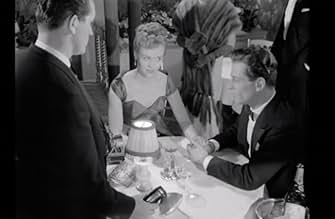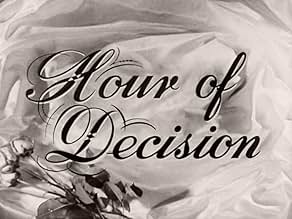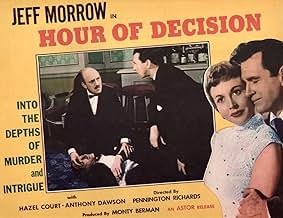Adicionar um enredo no seu idiomaAn American journalist solves the mystery of an unpleasant columnist's murder and clears his own wife, one of the many suspects.An American journalist solves the mystery of an unpleasant columnist's murder and clears his own wife, one of the many suspects.An American journalist solves the mystery of an unpleasant columnist's murder and clears his own wife, one of the many suspects.
- Direção
- Roteiristas
- Artistas
- Direção
- Roteiristas
- Elenco e equipe completos
- Produção, bilheteria e muito mais no IMDbPro
Avaliações em destaque
There wasn't much else to do in 1950s England go to a movie or to the pub. The other reviews here have really said it all. But things to watch out for the street scenes, the terrible decor of the 'smart' night club, the mid-Atlantic accents with the hope of endearing the film to American audiences,ditto actual American actor, Arthur Lowe cameo.
Anthony Dawson is a society columnist at the London night club he has made famous. He gets up to wander the tables, then sits down. When he gets up, he collapses, dead. The police, in the person of Carl Bernard, investigate. Newly wed reporter, Jeff Morrow (playing an alien instead of fighting them in scifi flicks) offers to help, and Bernard is agreeable. Morrow has more motive than a story; his wife, Hazel Court, is a suspect, although no one knows her name; she had been Dawson's lover before her marriage, and was trying to get some letters back.
It's a well constructed mystery, with Morrow wandering around, interviewing suspects, and as is usual, everyone had plenty of motive to kill Dawson. There's also some good outdoor photography by cinematographer Stanley Pavey as Morrow wanders past several landmarks, including the Fire monument, Buckingham Palace -- with the soldiers marching past -- and Picadilly Circus. C. M. Pennington-Richards directs efficiently, with a few tics standing in for character traits. Lionel Jeffries and Michael Balfour have nice little roles.
It's a well constructed mystery, with Morrow wandering around, interviewing suspects, and as is usual, everyone had plenty of motive to kill Dawson. There's also some good outdoor photography by cinematographer Stanley Pavey as Morrow wanders past several landmarks, including the Fire monument, Buckingham Palace -- with the soldiers marching past -- and Picadilly Circus. C. M. Pennington-Richards directs efficiently, with a few tics standing in for character traits. Lionel Jeffries and Michael Balfour have nice little roles.
Things were still economically tough in 1957 Britain, as well as grey, with many cities still showing the scars of war. The film makers in their efforts to help the average working men and women escape the dullness and grind of everyday life, a plethora of cheap second feature ' B' films were made in the 50's about about glitzy London, populated with American second rate actors, and stories about murder amongst the fashionable middle classes who could afford cars, champagne and go to night clubs and hotels. There's not one authentic working class individual to trouble the audience in this pedestrian whodunnit at the nightclub! It's another cheaply made black and white 50's film - which has the usual American actor to make the film saleable to American audiences. In this case it's uncharismatic and wooden, Jeff Morrow, playing the crime reporter helping Scotland Yard track down the killer of despised & obnoxious gossip columnist Gary Bax, played by Anthony Dawson. Too much of the film is spent in talking, with hardly any action to enlighten the proceedings. Many of the night club scenes come across as unconvincing with its owner, Lionel Jeffries rejoicing in the ridiculous name of 'Elvin Main' trying, but failing badly, to put on an American accent. The dialogue is tiresome, with a storyline which gives the cast little opportunity to express any emotions. The 'Agatha Christie' style ending where the killer is identified is all so hammy! Any redeeming features? None as I can see.
This whodunit gets off to a good start in Lionel Jeffries' nightclub as we're introduced to slippery, philandering, gossip columnist Gary Bax - Anthony Dawson, every bit as convincingly disreputable as he was in DIAL M FOR MURDER. He staggers out poisoned, and reporter Joe Saunders (Jeff Morrow) assists the police to track down the killer, knowing that their chief suspect is his wife Peggy (Hazel Court) who was being blackmailed by Bax over an earlier affair she'd had with him.
Strangely, chances are ignored to build much suspense around Peggy's predicament and the middle section falls rather flat as Joe and Carl Bernard's authoritative Inspector Gower interview a variety of suspects. The latter is one of the more interesting characters. "My parents had a twisted sense of humour, you won't get my first name out of me" he dryly remarks at one point. Shades of Morse. The plodding investigation and a singularly unconvincing denouement results in the film failing to fulfil its early promise. It's all put together with a certain style and sophistication however and will be enjoyed by those who appreciate British mystery films of the period, especially if they're fans of the glamorous Hazel Court.
Strangely, chances are ignored to build much suspense around Peggy's predicament and the middle section falls rather flat as Joe and Carl Bernard's authoritative Inspector Gower interview a variety of suspects. The latter is one of the more interesting characters. "My parents had a twisted sense of humour, you won't get my first name out of me" he dryly remarks at one point. Shades of Morse. The plodding investigation and a singularly unconvincing denouement results in the film failing to fulfil its early promise. It's all put together with a certain style and sophistication however and will be enjoyed by those who appreciate British mystery films of the period, especially if they're fans of the glamorous Hazel Court.
This 'B' feature murder mystery from Walton Studios would have never have set its sights on cinematic greatness but it really fails to spark into life at any stage. Jeff Morrow plays Joe Sanders, an ex-GI turned reporter, who spends almost the entire 81 minutes of the film trying to disprove the seemingly damning evidence against his wife (played by the lovely Hazel Court, wasted here). The premise is that someone knocked off the odious columnist Gary Bax (Anthony Dawson, enjoying himself as a slimy sophisticate), and of course, the entire cast have plenty of motives.
Morrow rather plods through the motions, most of the time hampered by an oversized raincoat, and a severe case of screen charisma bypass; Carl Bernard as Insp Gower offers some interest as an idiosyncratic detective; the ultimate denouement is a stagey 'crime reconstruction' scene reminiscent of Agatha Christie ( or is it Death in Paradise?) with all the suspects gathered together awaiting judgment.
It's invariably interesting to see who is picking up the smaller parts in these pics - and always great to see Lionel Jefferies, (but why the god awful American accent?) Arthur Lowe (later immortalised as Capt Mainwaring), has a small part as a pompous little man, in this case a Scientist - no one came close to doing it better.
Morrow rather plods through the motions, most of the time hampered by an oversized raincoat, and a severe case of screen charisma bypass; Carl Bernard as Insp Gower offers some interest as an idiosyncratic detective; the ultimate denouement is a stagey 'crime reconstruction' scene reminiscent of Agatha Christie ( or is it Death in Paradise?) with all the suspects gathered together awaiting judgment.
It's invariably interesting to see who is picking up the smaller parts in these pics - and always great to see Lionel Jefferies, (but why the god awful American accent?) Arthur Lowe (later immortalised as Capt Mainwaring), has a small part as a pompous little man, in this case a Scientist - no one came close to doing it better.
Você sabia?
- Citações
Tony Pendleton: Mr Gary Bax was immoral, disloyal and thoroughly selfish. I calculate there are at least a dozen other men who feel the way I do, and any one of them who's half-way decent would consider that killing Gary Bax was a public service - like clearing a blocked drain.
- Cenas durante ou pós-créditosIn the end credits Arthur Lowe's part is misspelled "Caligraphy Expert".
Principais escolhas
Faça login para avaliar e ver a lista de recomendações personalizadas
Detalhes
- Data de lançamento
- País de origem
- Idioma
- Locações de filme
- Piccadilly Circus, Piccadilly, Londres, Inglaterra, Reino Unido(establishing shot of London's clubland)
- Empresa de produção
- Consulte mais créditos da empresa na IMDbPro
- Tempo de duração
- 1 h 21 min(81 min)
- Cor
Contribua para esta página
Sugerir uma alteração ou adicionar conteúdo ausente













